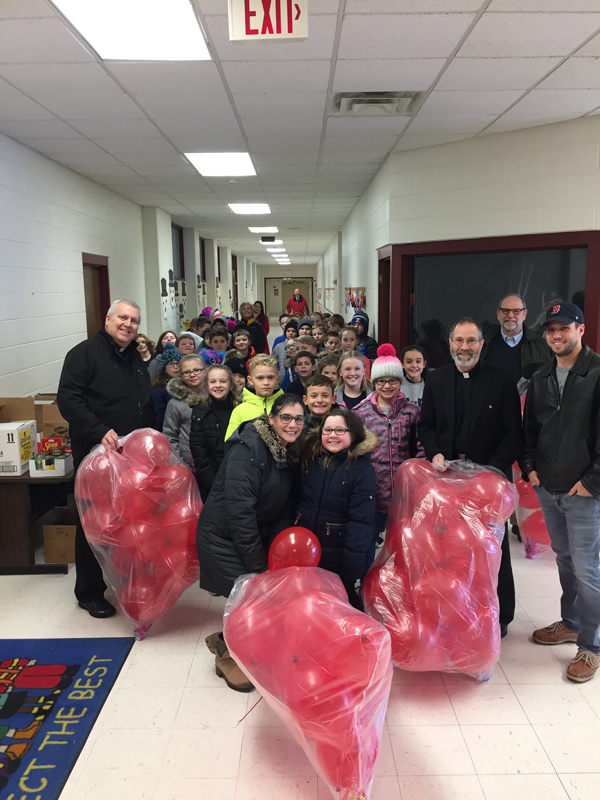By Lindsay Steele
The Catholic Messenger
BURLINGTON — About a year ago, Notre Dame fourth-grader Gwen White was diagnosed with a rare autoimmune disease called Juvenile Dermatomyositis (JDM).
“The disease attacks Gwen’s muscles and skin. For whatever reason, Gwen’s immune system won’t stop attacking itself. There is no known cause and currently, there is no cure,” said Gwen’s mom, Kerstin Quattromini.

Students and clergy from Notre Dame Catholic School in Burlington join Gwen White, center, her mom, Kerstin Quattromini (at Gwen’s left), and dad Tom White, far right, in a balloon release to honor a boy who passed away from Juvenile Myositis. Gwen is currently battling a form of the disease.
The disease took its toll on Gwen, and on her schooling. “When Gwen was first diagnosed she was still so weak and tired,” her mom explained. “We tried to send her to school but she just couldn’t do it. School took so much out of her; when she got home she would crash. It made it hard for her to get homework done.” She missed about three months of school.
Notre Dame stepped in by making accommodations for Gwen, allowing her the resources and flexibility necessary to keep up with her classmates. “Assistant Principal Judi Simon told us not to worry and that we would figure it out,” Gwen’s mom said. “They told us they would support Gwen in whatever she needed. … They took the worry away from us, and especially Gwen.” Gwen utilizes video and online resources when need be and receives extended time to complete assignments. The priority is for Gwen to “complete the educational standards that she will need as she progresses through her schooling,” Simon said.
he disease affects every child differently and is at times hard to treat, Gwen’s mom said. Gwen keeps her symptoms at bay through a medication regimen, applying sunscreen hourly when exposed to fluorescent lighting, staying out of the sun and receiving infusions every four weeks to boost her immune system. Gwen and her family have dealt with one relapse since the diagnosis.
The school has rallied around Gwen in a variety of ways since her diagnosis. Recently, after a boy in New Jersey died of complications from a severe form of JDM, fourth- and fifth-graders joined Gwen and her parents in releasing red balloons at the school in his honor. Principal Bill Maupin said, “This was one of the ways to show solidarity with Gwen and to honor the young man who had passed from the disease.”
Earlier this school year, when Gwen missed a Chromebook tutorial at school, a high school student offered to instruct her. In December, Notre Dame elementary had a jean day for the Cure JM Foundation. Gwen’s mom recalled, “We had shirts made that said ‘Gwen’s Gladiators’ and students could order them if they wanted and wear them on the jean day.” Part of the proceeds from the shirts went directly to Cure JM. Students who wore jeans that Friday paid $1, which also went to Cure JM.
When Gwen heads to Iowa City to receive her eight-hour, immune system-boosting infusion, the school remembers Gwen during morning prayers.
Simon said it is important to Notre Dame to step forward to help Gwen and her family “because of our faith and it is the Christian/Catholic and right thing to do. I personally would want someone to help my child or grandchild if I needed this.”
Gwen’s mom said the prayers and support from the Notre Dame community have been amazing. “We are so grateful for their continued support.”
About JM
Juvenile Myositis (JM) is a group of rare and life-threatening autoimmune diseases in which the body’s immune system attacks its own cells and tissues, according to the Cure JM Foundation. Approximately two to four children in a million in the United States are diagnosed with JM each year. Primary symptoms are weak or painful muscles, fatigue, fever and, for those with Gwen’s classification, skin rash. Some children also experience joint pain. Some children experience a mild form of the disease, while others experience a more severe and potentially more debilitating form. Although medications can help alleviate the symptoms, the disease has no known cure.
Despite the challenges, the majority of children grow up to lead an active, productive life, according to Cincinnati Children’s Hospital.











